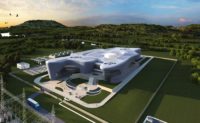Energy Construction
Google Picks Small Nuclear Reactors to Secure US Data Center Power
Deal with developer Kairos could have first facility on line as early as 2030

First demonstration molten salt reactor to be built by engineer-developer Kairos Power in Oak Ridge, Tenn. by 2027, is a precursor to its small nuclear reactors set to generate power for tech giant Google by 2030.
Image courtesy Kairos Power LLC
Just weeks after Microsoft said it will buy nuclear power to supply its AI-focused data centers, Google announced Oct. 14 it is entering into a deal it claims is the first U.S. corporate energy purchase from small modular reactors now in development.
Google said it has a power purchase agreement with California-based developer Kairos Power LLC for the power set to come from small sites that would generate up to 500 MW of new nuclear power by 2035—with the first reactor coming online as soon as 2030. The technology giant cited the need for new sources of zero-carbon power for its data centers, allowing Kairos to commit to building multiple small reactor projects with units rated from 50 MW to 75 MW. Small modular reactors put out considerably less power individually than conventional nuclear power plants, which can generate 1,000 MW or more.
Amazon Web Services, the tech firm’s cloud computing unit, also said this month it has a new deal with the Energy Northwest public utility consortium in Washington state for 320 MW of power from four advanced small reactors to start, and an option to increase that to 960 MW.
Amazon also signed an agreement with utility firm Dominion Energy to explore an estimated 300-MW SMR project near the existing North Anna nuclear power plant in Virginia. The Amazon unit also is leading a $500-million funding round for X-energy, its SMR technology firm.
The two firms' announced investments follow a September deal by Microsoft for data center power to be generated from what is described as a $1.6-billion revamp and restart of the Unit 1 reactor at the Three Mile Island nuclear plant in Londonderry Township, Pa. That unit, which is adjacent to the one that suffered a partial meltdown in 1979, operated successfully until it was shuttered in 2019 for economic reasons, said owner Constellation Energy.
Kairos Power did not specify where it will site the power plants to meet Google goals for 24/7 clean power use—possibly as many as seven—nor reveal financial terms of its agreement.
Christopher Ortiz, a spokesman for the developer, told ENR no contractor has yet been selected for the Google reactors, but that Kiewit Corp. unit TIC-The Industrial Co. has begun work on a salt production facility at the Kairos development campus in Albuquerque, N.M. It will produce high-purity molten salt coolant for the advanced reactors.
Barnard Construction Co. Inc., began construction in July for Kairos Power's Hermes low-power demonstration reactor—a precursor facility the developer says has U.S. Nuclear Regulatory Commission approval, and is the first permitted to use non-light-water technology in the U.S. in nearly 60 years.
The molten salt reactor is part of the Kairos “rapid iterative development approach” to develop and market nuclear power plant designs based on fluoride salt-cooled, high-temperature technology to cool the reactor core, it said.
Barnard is building the facility in Oak Ridge, Tenn., at a former U.S. Energy Dept. site that is set to complete by 2027 as a “critical step” to commercialize the technology, said Kairos Power. The Tennessee Valley Authority has been working with the developer to provide engineering, operations and licensing support.
The Hermes project received earlier funding under the U.S. Energy Dept.'s Advanced Reactor Demonstration Program, with the agency to directly invest about $303 million. Payments are based on milestones such as construction progress and application for a future federal operating license, it said.
Barnard and Kairos Power also are building engineering test units in Oak Ridge and Albuquerque that are designed to operate at high temperatures, using a special particle fuel coupled with a molten fluoride salt coolant, the company told the commission in a 2023 filing.
Google has said it aims for its operations to be carbon-neutral by 2030.
“The innovative, multi-plant agreement will support technology development by extending Kairos Power’s iterative demonstration strategy through its first commercial deployments," the company said. "Along the way, milestone-based accountability baked into the agreement will establish confidence in Kairos Power’s ability to deliver throughout the long-term partnership."





